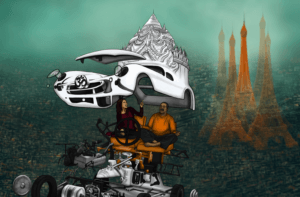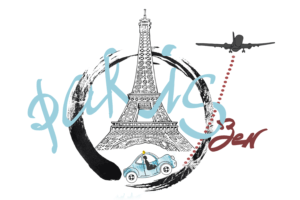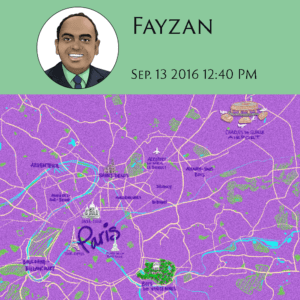“Je suis zen. Tout à fait zen.”

I lived in Paris while working at an aviation software company in 2016, and no one could ignore the political tensions from the American elections.
Most drivers I met in Paris were immigrants from French colonial Africa, or the French DOM (département d’outre–mer), which is like how Guam and Puerto Rico are to the USA. Many I talked to had moved alone to France, leaving their families behind. Most were living outside of Paris in the “banlieus” or suburbs, blocks of low-cost housing outside of the city. And most of them, after some prompting, would rail against immigration policies, and expressed, justifiably, frustration with the government of President Hollande. Many also expressed disgust at the success of the FN.
Fayzan was very different, not only in demeanor, but in his entire being. He was a driver for Blacklane, an airport service I liked to use in Europe. He was older, polite, and all smiles. He came from Morocco, and, after some generic conversation about France, he revealed that he was a Zen Buddhist.

“Is that common?” I asked. I had once briefly dated a man in upstate New York who was also a Zen Buddhist, and the practice seemed extremely painful.
“I am not common,” he responded, deadpan. And then he laughed.
I asked him how he got into it. “I didn’t,” he said, and then paused dramatically. “It got into me.” (It seemed that my driver was also a philosopher.)
“How do you deal with the pain?” I asked.
“I don’t notice it. I find myself as well while meditating. All of this–” he waved vaguely–“goes away.”
“Can you make Trump go away?” I asked under my breath.
“I can even meditate while driving,” the Zen Buddhist added.
“Please don’t,” I told him.
He laughed again. We were almost at the airport.
“So how do you deal with anger? With what’s happening?” I asked.
“Anger? No anger. I’m zen, completely zen.”
“You mediate it away?”
“No, no.” He gave me a pitying look. “You embrace it.”
I thought about that statement for a moment.
“Come,” Fayzan continued. “Let’s listen to some meditation music. Let me know if you like it.”
I pondered this world of violence, sadness and anger amidst the music of Buddhist monks in Tibet while in a town car on my way to Charles de Gaulle. We were silent for the rest of the ride, but it did not feel awkward. Perhaps Fayzan really was meditating: Perhaps he was embracing my anger, until it was no more.

About the artist

Paula Vrinceanu: “I am a Romanian visual artist working in this field for about 10 years now. Before this, I was a pianist: my life has always been an interesting and creative journey. I still play the piano when I have time, but now I’m focusing on visual art. I work in an advertising agency in Cluj, and at night- for few hours ( because, unfortunately, I need to sleep), I freelance and work on my own art business which I’ve started this year.

[…] story relays a conversation with a Moroccan cab driver in Paris, who happens to be a Zen […]